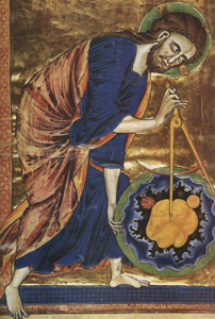
 “In creating the world, God used arithmetic, geometry,
and likewise astronomy.” – Nicholas of Cusa (click here for
article)
“In creating the world, God used arithmetic, geometry,
and likewise astronomy.” – Nicholas of Cusa (click here for
article)
Faith may even be latent in some of science's triumphs, inspiring such
figures as Newton and Kepler. The conviction that there is an order to
things, that the mind can comprehend that order and that this order is
not infinitely malleable, those scientific beliefs may include elements
of faith.
...
Reason then, has its limits. The philosopher Robert Fogelin's new book,
Walking the Tightrope of Reason (Oxford,
$22) is subtitled “The Precarious
Life of a Rational Animal” because, he argues, reason's own processes
negotiate a precipice. Mr. Fogelin quotes Kant, who described a dove who “cleaving
the air in her free flight, and feeling its resistance, might imagine that
its flight would be still easier in empty space.”
Failing to understand what keeps her aloft and taking a leap of faith,
the dove might set off in “empty space” – a vacuum – and plummet.
But reason might lead to the same end: if something offers resistance then
logically can't one proceed more easily if it is eliminated? So why not
try?
The problem is that the bird can never fully comprehend the
medium through which it experiences the world. In many ways, Kant argued, neither
could the mind. Reason is still the only tool available for certain knowledge,
but it also presents questions it is unable to answer fully.
Some of those questions may remain even after contemporary
battles cease: how much faith is involved in the workings of reason and how much
reason lies in the assertions of faith?

